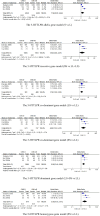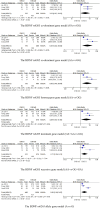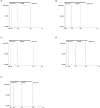The effect of single nucleotide polymorphisms on depression in combination with coronary diseases: a systematic review and meta-analysis
- PMID: 38745947
- PMCID: PMC11091366
- DOI: 10.3389/fendo.2024.1369676
The effect of single nucleotide polymorphisms on depression in combination with coronary diseases: a systematic review and meta-analysis
Abstract
Background: Depression and coronary heart disease (CHD) have common risk mechanisms. Common single nucleotide polymorphisms (SNPs) may be associated with the risk of depression combined with coronary heart disease.
Methods: This study was designed according to the PRISMA-P guidelines. We will include case-control studies and cohort studies investigating the relationship between gene SNPs and depression and coronary heart disease comorbidities. The Newcastle-Ottawa Scale (NOS) will be used to assess the risk of bias. When measuring dichotomous outcomes, we will use the odds ratio (OR) and 95% confidence interval (95%CIs) in a case-control study. Five genetic models (allele model, homozygous model, co-dominant model, dominant model, and recessive model) will be evaluated for each included study. Subgroup analysis by ethnicity will be performed. If necessary, post hoc analysis will be made according to different types.
Results: A total of 13 studies were included in this study, and the types of genes included are FKBP5 and SGK1 genes that act on glucocorticoid; miR-146a, IL-4-589, IL-6-174, TNF-α-308, CRP-717 genes that act on inflammatory mechanisms; eNOS genes from endothelial cells; HSP70 genes that act on the autoimmune response; ACE2 and MAS1 genes that act to mediate Ang(1-7) in the RAS system; 5-HTTLPR gene responsible for the transport of serotonin 5-HT and neurotrophic factor BDNF gene. There were three studies on 5-HTTLPR and BDNF genes, respectively, while there was only one study targeting FKBP5, SGK1, miR-146a, IL-4-589, IL-6-174, TNF-alpha-308, CRP-717, eNOS, HSP70, ACE2, and MAS1 genes. We did not perform a meta-analysis for genes reported in a single study, and meta-analysis was performed separately for studies exploring the 5-HTTLPR and BDNF genes. The results showed that for the 5-HTTLPR gene, there was a statistically significant association between 5-HTTLPR gene polymorphisms and depression in combination with coronary diseases (CHD-D) under the co-dominant model (LS vs LL: OR 1.76, 95%CI 1.20-2.59; SS vs LL: OR 2.80, 95%CI 1.45 to 5.41), the dominant model (LS+SS vs LL: OR 2.06, 95%CI 1.44 to 2.96), and the homozygous model (SS vs LL: OR 2.80 95%CI 1.45 to 5.5.41) were statistically significant for CHD-D, demonstrating that polymorphisms in the 5-HTTLPR gene are associated with the development of CHD-D and that the S allele in the 5-HTTLPR gene is likely to be a risk factor for CHD-D. For the BDNF gene, there were no significant differences between one of the co-dominant gene models (AA vs GG: OR 6.63, 95%CI 1.44 to 30.64), the homozygous gene model (AA vs GG: OR 6.63,95% CI 1.44 to 30.64), the dominant gene model (GA+AA vs GG: OR4.29, 95%CI 1.05 to 17.45), recessive gene model (AA vs GG+GA: OR 2.71, 95%CI 1.16 to 6.31), and allele model (A vs G: OR 2.59, 95%CI 1.18 to 5.67) were statistically significant for CHD-D, demonstrating that BDNFrs6265 gene polymorphisms are associated with the CHD-D development and that the A allele in the BDNFrs6265 gene is likely to be a risk factor for CHD-D. We analyzed the allele frequencies of SNPs reported in a single study and found that the SNPs in the microRNA146a gene rs2910164, the SNPs in the ACE2 gene rs2285666 and the SNPs in the SGK1 gene rs1743963 and rs1763509 were risk factors for the development of CHD-D. We performed a subgroup analysis of three studies involving the BDNFrs6265 gene. The results showed that European populations were more at risk of developing CHD-D than Asian populations in both dominant model (GA+AA vs GG: OR 10.47, 95%CI 3.53 to 31.08) and co-dominant model (GA vs GG: OR 6.40, 95%CI 1.98 to 20.73), with statistically significant differences. In contrast, the studies involving the 5-HTTLPR gene were all Asian populations, so subgroup analyses were not performed. We performed sensitivity analyses of studies exploring the 5-HTTLPR and BDNF rs6265 genes. The results showed that the results of the allele model, the dominant model, the recessive model, the homozygous model and the co-dominant model for both 5-HTTLPR and BDNF rs6265 genes were stable. Due to the limited number of studies of the 5-HTTLPR and BDNF genes, it was not possible to determine the symmetry of the funnel plot using Begg's funnel plot and Egger's test. Therefore, we did not assess publication bias.
Discussion: SNPs of the microRNA146a gene at rs2910164, the ACE2 gene at the rs2285666 and the SGK1 gene at rs1743963 and rs1763509, and the SNPs at the 5-HTTLPR and BDNF gene loci are associated with the onset of comorbid depression in coronary heart disease. We recommend that future research focus on studying SNPs' impact on comorbid depression in coronary heart disease, specifically targeting the 5-HTTLPR and BDNF gene at rs6265.
Systematic review registration: https://www.crd.york.ac.uk/prospero/, identifier CRD42021229371.
Keywords: coronary heart disease; depression; gene polymorphisms; meta-analysis; single nucleotide polymorphisms; systematic review.
Copyright © 2024 Zhang, Gao, Yang and Kong.
Conflict of interest statement
The authors declare that the research was conducted in the absence of any commercial or financial relationships that could be construed as a potential conflict of interest.
Figures






Similar articles
-
The important effect of 5-HTTLPR polymorphism on the risk of depression in patients with coronary heart disease: a meta-analysis.BMC Cardiovasc Disord. 2020 Mar 18;20(1):141. doi: 10.1186/s12872-020-01424-1. BMC Cardiovasc Disord. 2020. PMID: 32188408 Free PMC article.
-
Association of SGK1 Polymorphisms With Susceptibility to Coronary Heart Disease in Chinese Han Patients With Comorbid Depression.Front Genet. 2019 Oct 1;10:921. doi: 10.3389/fgene.2019.00921. eCollection 2019. Front Genet. 2019. PMID: 31632443 Free PMC article.
-
Lack of association of tumor necrosis factor superfamily member 4 (TNFSF4) gene polymorphisms (rs3850641 and rs17568) with coronary heart disease and stroke: A systematic review and meta-analysis.Anatol J Cardiol. 2018 Feb;19(2):86-93. doi: 10.14744/AnatolJCardiol.2017.8069. Anatol J Cardiol. 2018. PMID: 29424751 Free PMC article.
-
Meta-analysis of the association of the rs2234693 and rs9340799 polymorphisms of estrogen receptor alpha gene with coronary heart disease risk in Chinese Han population.Int J Med Sci. 2013;10(4):457-66. doi: 10.7150/ijms.5234. Epub 2013 Mar 2. Int J Med Sci. 2013. PMID: 23471591 Free PMC article.
-
Lack of association between leptin G-2548A polymorphisms and obesity risk: Evidence based on a meta-analysis.Obes Res Clin Pract. 2015 Jul-Aug;9(4):389-97. doi: 10.1016/j.orcp.2015.01.002. Epub 2015 Feb 27. Obes Res Clin Pract. 2015. PMID: 25733497
Cited by
-
Association of MicroRNA-146a-5p Polymorphism with Cognitive Impairment in Adolescents with Depressive Disorder.Mol Syndromol. 2025 May;16(3):216-222. doi: 10.1159/000542064. Epub 2024 Nov 29. Mol Syndromol. 2025. PMID: 40475169 Free PMC article.
-
Cardiovascular Implications of Lipoprotein(a) and its Genetic Variants: A Critical Review From the Middle East.JACC Asia. 2025 Jul;5(7):847-864. doi: 10.1016/j.jacasi.2025.04.012. JACC Asia. 2025. PMID: 40610121 Free PMC article. Review.
-
CYP2D6 polymorphism rs1065852 significantly increases the risk of type 2 diabetes.Ann Med. 2025 Dec;57(1):2470956. doi: 10.1080/07853890.2025.2470956. Epub 2025 Mar 3. Ann Med. 2025. PMID: 40028882 Free PMC article.
References
-
- GBD 2017 Disease and Injury Incidence and Prevalence Collaborators . Global, regional, and national incidence, prevalence, and years lived with disability for 354 diseases and injuries for 195 countries and territories, 1990-2017: a systematic analysis for the Global Burden of Disease Study 2017. Lancet. (2018) 392:1789–858. doi: 10.1016/S0140-6736(18)32279-7 - DOI - PMC - PubMed
-
- van Melle JP, de Jonge P, Spijkerman TA, Tijssen JG, Ormel J, van Veldhuisen DJ, et al. . Prognostic association of depression following myocardial infarction with mortality and cardiovascular events: A meta-analysis. Psychosom Med. (2004) 66:814–22. doi: 10.1097/01.psy.0000146294.82810.9c - DOI - PubMed
Publication types
MeSH terms
LinkOut - more resources
Full Text Sources
Medical
Research Materials
Miscellaneous

